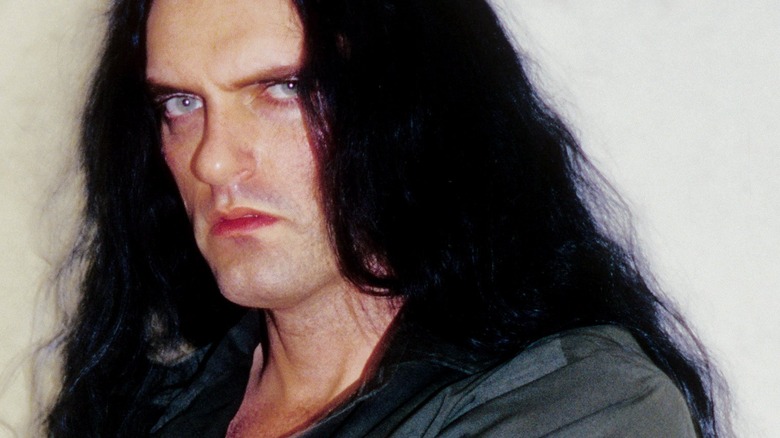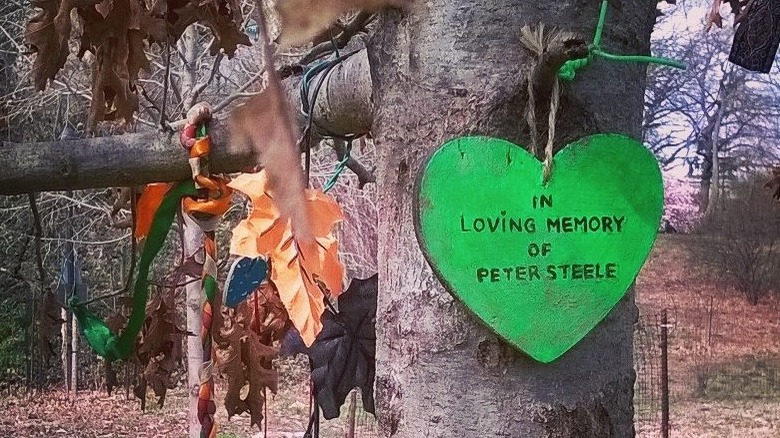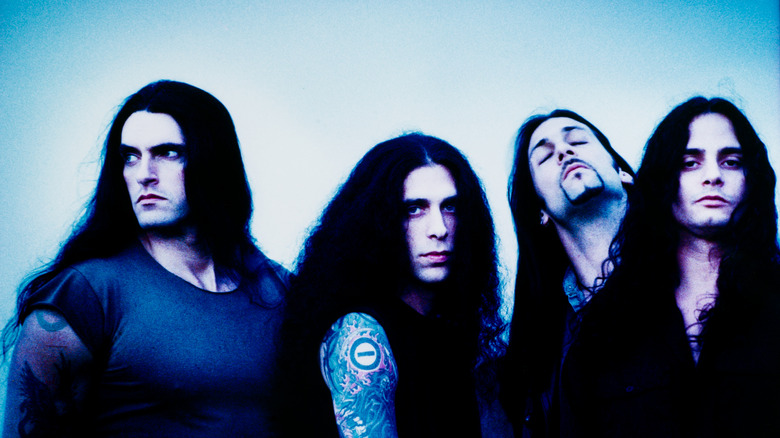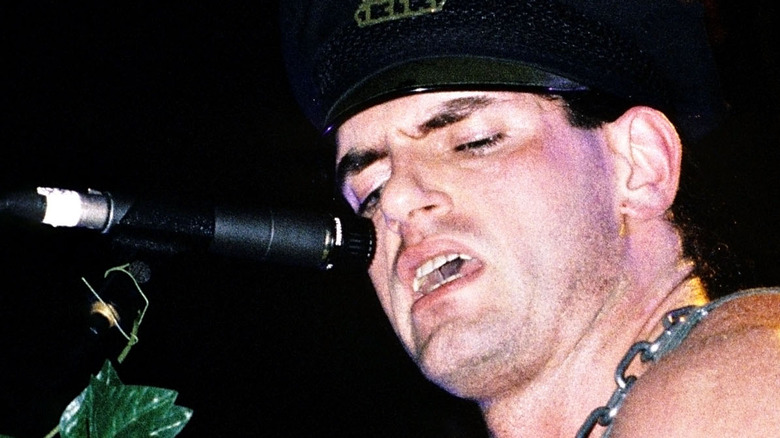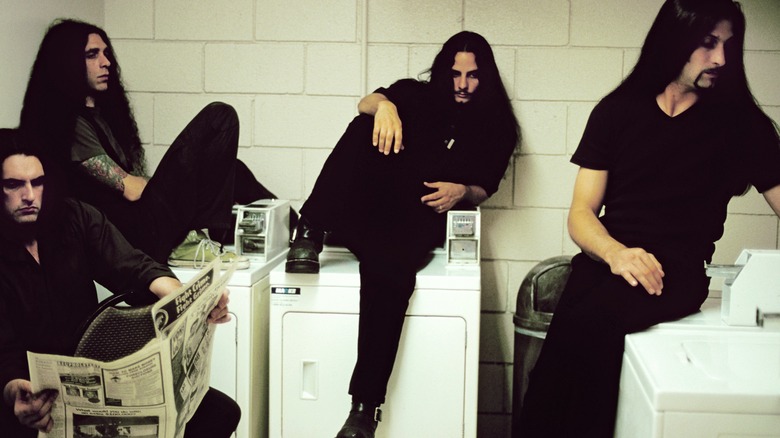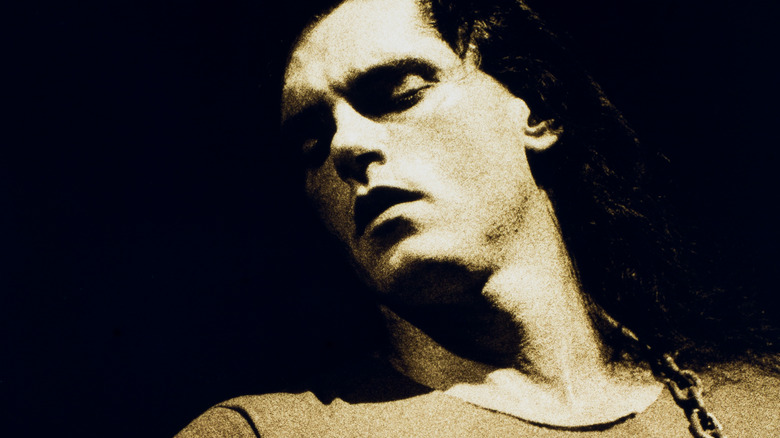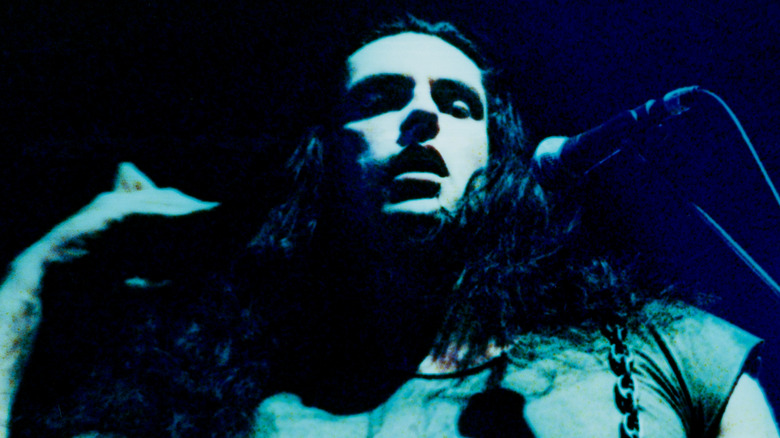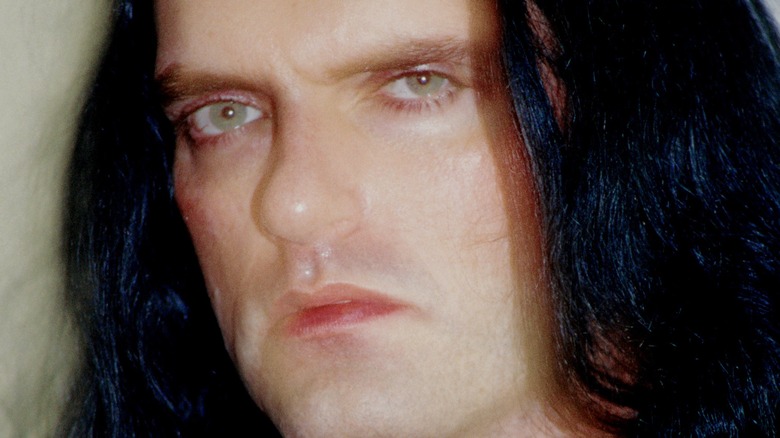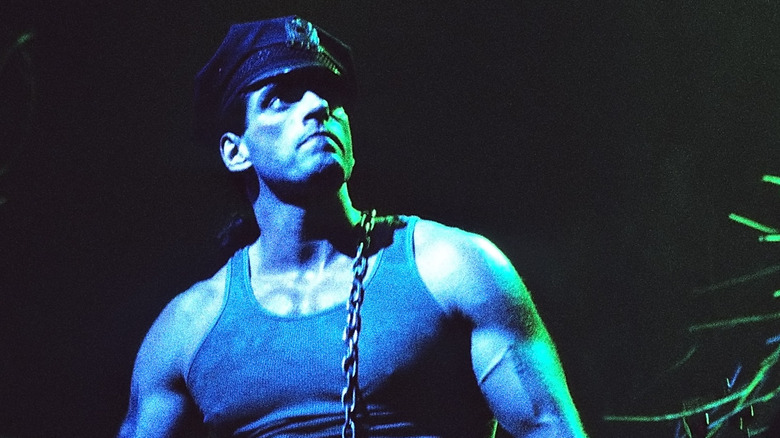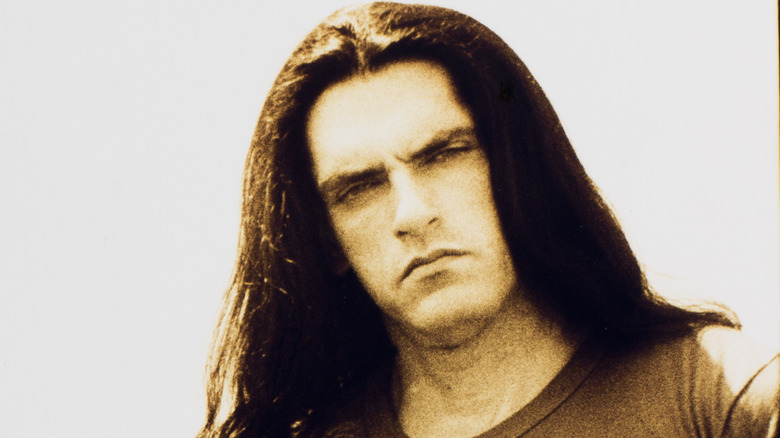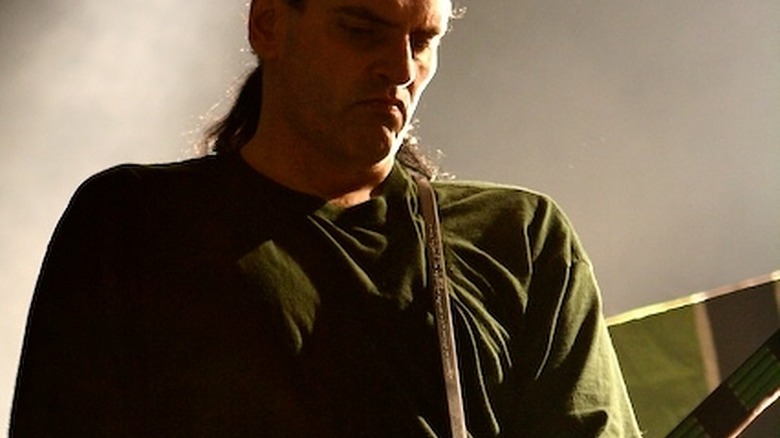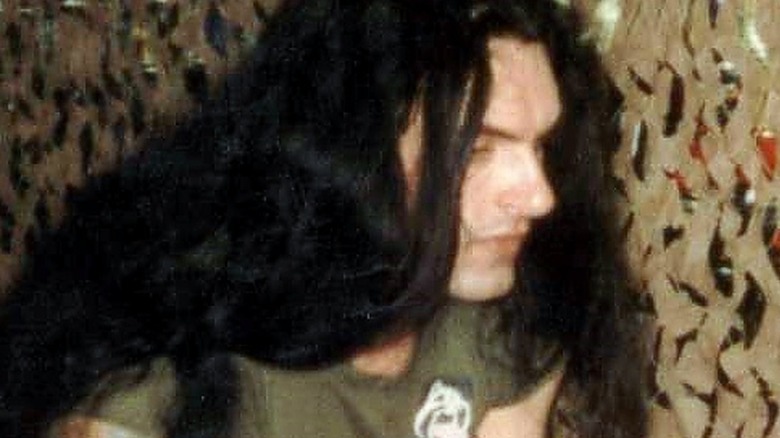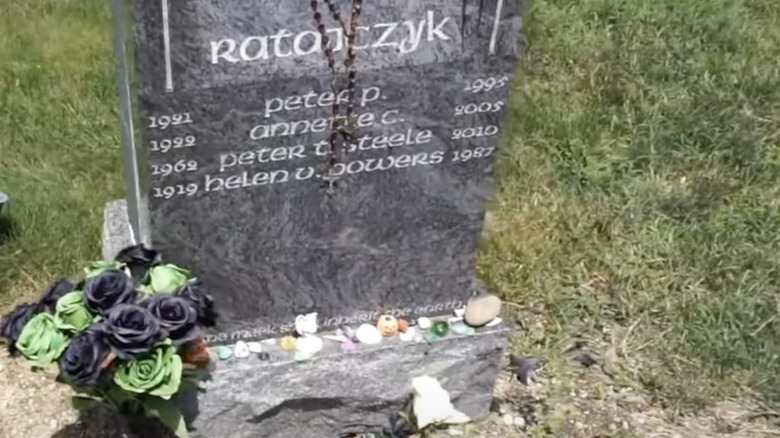Tragic Details About Type O Negative's Peter Steele
Peter Steele was the imposing frontman of the iconic Goth metal band Type O Negative. He was 6'8", had black hair past his shoulders, and crooned about werewolves and lost loves in a rich baritone. His lyrics, equally steeped in Gothic imagery and dry humor, drew hardcore fans to the band. As noted by Billboard, with a 1996 spread in Playgirl, Steele came to be regarded as an alternative sex symbol. The band was often embroiled in controversy, usually because Steele's sense of humor was easily misunderstood, both in their lyrics and in interviews. As stated by Revolver Mag, they dealt with everything from canceled gigs to bomb threats as a result of misinterpreted jokes. Offstage, Steele was battling his own demons.
"My impression of Peter [Steele] was he wanted to be a normal person really bad ... but he couldn't," Type O Negative bandmate Johnny Kelly wrote (quoted by Consequence). Steele was never secretive about the personal struggles that he used to fuel his work, including failed romances, addiction, loss, grief, and depression. He had never truly wanted to become a full-time rock star, and as stated by Loudersound, when the band was at the height of its popularity, Steele was at his worst. At one time, he was forced into a psychiatric unit before serving time at Rikers Island. His sudden death at the age of 48 left a void in metal music and the Goth scene that has never been truly filled.
Peter Steele never wanted to be a rock star
Before Peter Steele was famous for Type O Negative, he was in a thrash-influenced metal band called Carnivore. After Carnivore broke up, the bandmates were forced to get regular jobs outside of music. For some musicians this would've been devastating, but as described by Loudersound, for Steele the real tragedy would be quitting his day job.
In the time between Carnivore and Type O Negative, Steele went to work for the New York City Parks Department. In an interview with Revolver Mag, former vice president of A&R for Roadrunner Records, Monte Conner, who was responsible for signing Type O Negative, stated that this was the time that Peter Steele was happiest. "He liked being at home. He liked his routine and he really liked working for the Parks Department ... Pete was like the Jolly Green Giant. You can picture him going through the park doing his thing, saying hello to all the old ladies and probably bringing bagels for the homeless."
Steele was still making music while working for his day job (in fact, per Revolver Mag, Steele once stated that he wrote one of their biggest hits while driving a garbage truck) but he wasn't interested in touring. He resisted for long enough that it became a source of conflict within the band, even causing their drummer to leave Type O Negative. Ultimately, Steele was convinced to go on tour with the band, forcing him to quit the job he loved at the Parks Department.
He was never satisfied
While Peter Steele is now known as one of the most influential figures in Goth metal, he himself was a perfectionist and was never fully happy with his own work.
In one interview, Steele became enraged at a critical review of Type O Negative's first album, "Slow Deep & Hard," but in the same interview he himself criticized the album, stating that he had had to scramble to write the songs in a single evening and it was only supposed to be a demo. According to his collaborators, it wasn't just songs that he was forced to write in a few hours that he was critical of. Monte Conner, who first signed Type O Negative, described Steele and his bandmates as geniuses who had created a masterpiece with their album "Bloody Kisses" and told Revolver Mag that Steele's perfectionism about the album was the most frustrating part of working with him.
"Peter was extremely picky about the entire presentation of the band, from the album covers to the sayings on there," Conner stated. "Pete was obsessed with the color green and having green on all the covers. And it had to be the right green ... Peter would literally spend hours looking through hundreds of different shades of green until he found the one he wanted."
He believed most of his fans didn't understand his music
Type O Negative's music often had a heavy sound paired with Peter Steele's mournful lyrics that were filled with classic horror imagery. Along with vengeance, failed romances, and werewolves, Steele liked to infuse their songs with humor. Behind their Gothic image, Steele's dry sense of humor was often missed. In an interview with NJ, Steele stated that he believed most of their listeners were missing the humor in their music, saying, "People don't get the joke, which is that we think we're the joke."
Some of the criticisms levied against Type O Negative that frustrated Steele the most came from reviewers that seemed to interpret the band as being more serious than they were. In an interview, Peter Steele described the band as "completely unserious ... a lot of what I say is like cornball stuff. On stage and off, we certainly don't take ourselves as serious as people seem to think we do."
One of Steele's jokes led to bomb threats
While their lyrics could be controversial and were often misinterpreted, it was one of Peter Steele's comments offstage that led to the most controversy. In an interview, Steele made a reference to a famous John Lennon quote that led to protests and canceled concerts — just as the original joke had done to the Beatles.
As recounted by Rolling Stone, in a TV interview John Lennon quipped that the Beatles were more popular than Jesus. The joke set off a wave of protests against the Beatles in 1966. During a 1991 tour of Europe, Steele gave an interview with a German magazine in which he described Type O Negative as being more popular in Germany than Adolf Hitler. The comment was intended to be a joke, but according to Steele it was misinterpreted as being a genuine endorsement of fascism. There were protests, and their label received bomb threats.
In an interview, Steele confirmed that he was anxious to go back to Europe after the experience, but that it was important to him to set the record straight. "I want to show people that I'm not really who they think I am ... we're just here to play lousy music."
He was unlucky in love
While there was a sarcastic humor in all of Peter Steele's work, there was genuine emotion in his songs, much of which came from his tormented love life. In the liner notes for the album "Bloody Kisses" was the message: "This entire opus is respectfully dedicated to all those who have loved unconditionally only to have their hearts unaesthetically ripped out: Base not your joy upon the deeds of others, for what is given can be taken away. No hope = no fear. — Peter" (quoted by Revolver Mag).
As noted by Kerrang, Steele himself attributed the darkest times in his life to the fallout from his failed relationships. Many of the songs that Peter Steele wrote for Type O Negative were about his ex-girlfriends and former lovers. One of the band's most beloved songs, "Black No. 1," was based on one of Steele's failed relationships, one which Steele stated had made him suicidal. When asked about his suicide attempt, Steele stated, "All I can say is I fell in love with the wrong person."
If you or anyone you know is having suicidal thoughts, please call the National Suicide Prevention Lifeline by dialing 988 or by calling 1-800-273-TALK (8255).
He was open about his mental health struggles
Peter Steele was very open about his suicide attempt, describing it as "a symbolic death ... I don't consider myself that person anymore."
He often spoke openly about his mental health struggles in general, describing his experiences with addiction, bipolar disorder, and depression. In an interview with KNAC, Steele stated that about one out of every three days was a good one for him, and he often only got out of bed in the mornings to care for his five beloved cats. In an interview with the ROC, Steele described life as "pretty much a waste of time."
During the production of one of their albums, Steele was going through a hard time and decided to go off of his prescribed medication, something which he stated had a tremendous impact on his writing. On his more depressive days, he would write extremely long somber songs, while on his more manic days he would write "a frenzy of songs."
If you or someone you know needs help with mental health, please contact the Crisis Text Line by texting HOME to 741741, call the National Alliance on Mental Illness helpline at 1-800-950-NAMI (6264), or visit the National Institute of Mental Health website.
He was profoundly impacted by his father's death
Peter Steele's father died in February of 1995, and he struggled to accept what had happened. In an interview with As Long As It's Black, he admitted that he hadn't gone to the funeral and had waited more than four years to visit the grave. According to Steele, losing his father had caused him to develop "an obsession with death and loss."
The experience of his father's illness and death inspired some of Steele's darkest and most personal work. The song "Todd's Ship Gods" is about the experience of visiting his father's grave for the first time. In interviews, Steele described how for months after his father's death he continued to receive medical bills in the mail, charging his family for medical tests and procedures that had ultimately failed to help his father. This experience inspired the title track for the album "Life Is Killing Me," which has lyrics that are highly critical of doctors and the for-profit medical system in general.
Using personal tragedy to fuel his work made performing difficult
Peter Steele often used the things that made him the most emotional as inspiration for his work, and the emotional heart of Type O Negative's songs is a large part of what drew their fans to the music. However, using personal tragedy to write the songs made it painful for Steele to perform them onstage over and over while on tour.
In particular, the songs "Everything Dies" and "Everyone I Love is Dead" from the album "World Coming Down" directly referenced deaths in Steele's family, including his father's. According to an interview with bandmate Josh Silver for Revolver Mag, "Peter had problems performing on the record because it hit home so much. It made him very upset to sing some of those songs, even though he wrote them."
While "World Coming Down" is the most notoriously dark Type O Negative album and "Life Is Killing Me" contains multiple songs about Steele's father, they aren't the only ones that describe tragedy in Steele's life. The title track on the album "Bloody Kisses" is actually about the death of Steele's beloved cat Venus. As quoted in Revolver Mag, Steele stated that he kept the lyrics intentionally vague. "No one wants to hear a guy who's six-foot-eight with long black hair and fangs crying about his ... cat, so I had to make it extremely metaphorical... I have a huge problem with abandonment and loss, so I took it very seriously."
Steele struggled with addiction
Peter Steele developed issues with alcohol and cocaine. In an interview with Metal Hammer (via Loudersound), Steele described it as a part of a pattern of self-destructive behavior that also included wearing provocative clothing to provoke fights and putting signs outside his house encouraging intruders in his unlocked home.
Steele didn't start experimenting with drugs until he was 35 years old and Type O Negative was already a success. In an interview with Revolver Mag, Steele described how risky his drug use while touring was, because people were always offering him drugs, and he couldn't guarantee that it was from a safe source. His bandmate Kenny Hickey described how Steele's addiction was accompanied by serious depression that stopped him from doing the things he enjoyed and made his work despondent.
"It's hurt me, it's hurt my friends and family and it's hurting the band, my reputation," Steele told Blabbermouth. "Fortunately, I feel like I have a second chance, and maybe I can make amends by saying to the fans, don't try it!"
If you or anyone you know needs help with addiction issues, help is available. Visit the Substance Abuse and Mental Health Services Administration website or contact SAMHSA's National Helpline at 1-800-662-HELP (4357).
Steele's family forced him into treatment
After his father's death, Peter Steele used more drugs to cope. In an interview with Artisan Service News, Steele admitted that in the moment, it felt great and he believed that he was immortal. In reality, he was out of control. Soon, his family decided to step in — but to Steele, it was a betrayal.
Steele didn't believe that his family was acting altruistically when they forced him into treatment, and he felt that they didn't have the right to take the choice away from him. According to Steele, his family had him taken from his home on Christmas Eve and brought to a psychiatric facility against his will. From there, he found himself first in jail, and then in rehab. The event drove a wedge between him and his family. In an emotional interview, Steele told an interviewer, "I just feel that certain people who said that they 'loved me' took advantage of my situation ... It makes me very sad. "
Steele spent time in Rikers Island
While Peter Steele was at the height of his risky drug use, he found out that his longtime girlfriend had cheated on him. He assaulted her new boyfriend and ended up spending around a month at New York City's main prison complex, Rikers Island.
"I had been with this one woman for 10 years and when I found out what had been going on, I pretty much went berserk," Steele told Metal Hammer, "When I found out about her and her boyfriend, I knocked on their door at five in the morning and smacked the guy in the face."
In an interview with Blabbermouth, Steele stated that he never had any trouble with the other men being held at Rikers Island. Instead, it was the total lack of privacy and complete control over him that the guards had that made his time there difficult. The worst was that he wasn't allowed to make more than a single eight-minute phone call a day, and he was worried about his mother. "The worst thing that the system could ever have done was to send me to jail," Steele stated in an interview with Artisan News Service. "What else do you have to do with your time but to speak to other criminals? ... Now I'm just wanting to become a better criminal."
His death was unexpected
Peter Steele had spent years struggling with mental illness and coping with the aftermath of his father's death and tumultuous relationships with drugs and alcohol, but after the band's final 2009 tour, it seemed like things were looking up for him. As described by his bandmate Sal Abruscato in an interview with Loudersound, Steele seemed to be doing better than he had been in years. He was sober, seemed excited to make more music, and was hopeful about the future. Then suddenly he was gone.
One of Steele's beloved cats, Tito, was very sick, and his bandmates had been concerned that he might relapse. According to an interview with Billboard, they attempted to get in touch with him, but were only able to talk to his girlfriend who told them that Steele was sick with the flu. He died shortly after, of sepsis caused by diverticulitis (via Nepa Scene), the same day as his cat Tito. According to a blog run by his loved ones, the remainder of Steele's cats were adopted by his older sister Pam.
